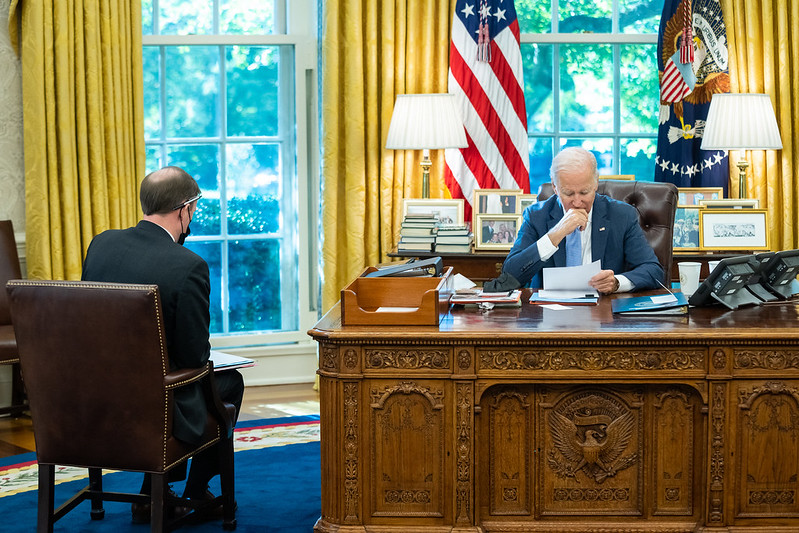Biden’s defence and national security strategies will make or break US response to global challenges

As US President Joe Biden enters his second year in office, his administration is expected to
soon release a slew of strategic documents that will set out how it will approach and respond to a rapidly deteriorating international security environment. These documents—nested together like Babushka dolls—will give us the clearest understanding yet of how the US intends to use all levers of national power to approach intensifying geostrategic competition and respond to the long-term structural challenge China poses to the international system.
So, what can we expect these strategies to cover?
At the core of Biden’s response will be the overarching US national security strategy.
Mandated by Congress through the 1986 Goldwater–Nichols Act, national security strategies are published early in a president’s time in office to set out the security challenges facing the country and explain how an administration will address them.
Last March, Biden
released interim national security strategic guidance, the
first time such a document has been issued by the White House. Coming off the 6 January Capitol insurrection and the turmoil of Donald Trump’s administration, it was heavily focused on strengthening democracy at home; investing in America’s national strengths; rebuilding alliances and partnerships; re-engaging in the international system; and responding to increased geostrategic competition, including the ‘sustained challenge’ to the stable and open international system from China.
While predicting is a precarious art, it seems safe to assume that the full strategy will cover similar themes. The US will likely remain primarily focused on outcompeting China at a systemic level, while ensuring
guardrails are in place to prevent tensions from veering into conflict. Global challenges that transcend borders and require collective action—such as climate change and the Covid-19 pandemic—will likely feature heavily, particularly as a way to re-establish US leadership internationally. The third major focus of the strategy will likely be domestic renewal, with a focus on reinvigorating the US’s national strengths to build a more resilient, prosperous and secure nation.
Sitting underneath the national security strategy, the long-awaited national defence strategy
will set out a plan for how America will respond to an increasingly complicated and complex security landscape. With China the Pentagon’s
top priority, judging by a number of
recent remarks by top US officials, the defence strategy will likely focus on raising the costs for China to change its calculations on Taiwan. It will also likely focus on preparing the US for great-power conflict; establishing integrated deterrence across multiple domains; and dispersing forces and assets to better project power across the Indo-Pacific.
One of the US’s greatest strengths is its network of allies and partners around the world—a powerful force multiplier and deterrent in itself—and we can expect the defence strategy to elevate the importance of allies and partners, particularly to address global security challenges and allow the US to enhance its focus on the Indo-Pacific.
Alongside the national defence strategy, the Pentagon is also expected to release a
missile defence review and a
nuclear posture review. The review of the US’s missile defence policy and posture will be set in a landscape of
increasingly sophisticated adversaries. The administration’s nuclear strategy and posture have been the subject of fierce debate due to Biden’s
long-time support for the US to move to a sole-purpose or no-first-use nuclear declaratory policy, which would prohibit the use of nuclear weapons by the US except as a response to a nuclear attack. Given the concerns among
allies and partners around the world, it’s unlikely the review will bring any change to US nuclear declaratory policy. What will be of interest, however, is how it responds to the
rapid scaling up of China’s nuclear arsenal.
With the overarching national security and defence strategies and reviews, one hopes the Biden administration will bring a truly integrated, whole-of-government approach to the table. This must be more than a congressionally mandated bureaucratic exercise, because Biden’s strategies will help make or break how the US responds to this decisive next decade of geostrategic competition. Facing challenges on multiple fronts—from Russia and Iran to Myanmar and North Korea—the test for the Biden administration will be how it prioritises and addresses them. Translating strategy to action is hard at the best of times, let alone for an ‘overstretched hegemon’ with an unwieldy bureaucracy, ongoing domestic upheaval and a fractured political landscape.
The US will have to balance the pull of international responsibilities and multiple, immediate crises by remaining clear-eyed and focused on the long-term structural challenge presented by China. The problems that lie ahead have no historical precedent but they aren’t for the US alone to face or to solve. With our own equities and interests in maintaining the rules-based international order, Australia—and other like-minded nations—will watch the release of Biden’s strategies closely. It’s a decisive decade for all of us.
 Print This Post
Print This Post